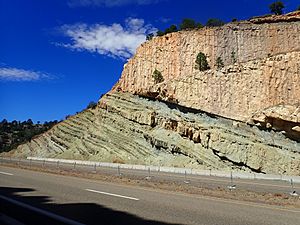Romeroville Sandstone facts for kids
The Romeroville Sandstone is a type of rock layer found in northeastern New Mexico. It was formed a very long time ago, during the Cretaceous Period, specifically in a time called the Cenomanian Age.
Quick facts for kids Romeroville SandstoneStratigraphic range: Cenomanian |
|
|---|---|

Romeroville Sandstone beds resting on Pajarito Formation, I-25 road cut, Romeroville, New Mexico, USA
|
|
| Type | Formation |
| Unit of | Dakota Group |
| Underlies | Graneros Shale |
| Overlies | Pajarito Formation |
| Thickness | up to 9 m (30 ft) |
| Lithology | |
| Primary | Sandstone |
| Other | Siltstone |
| Location | |
| Coordinates | 35°31′33″N 105°14′17″W / 35.5258°N 105.2380°W |
| Region | New Mexico |
| Country | |
| Type section | |
| Named for | Settlement of Romeroville, New Mexico |
| Named by | Kues and Lucas |
| Year defined | 1987 |
What is the Romeroville Sandstone?
This rock layer is mostly made of yellow-gray sandstone. Sandstone is a type of rock formed from tiny sand grains. It also contains a small amount of siltstone, which is made from even finer particles than sand.
The sandstone often has special patterns called planar crossbeds. These patterns show how sand was moved by water or wind long ago. Sometimes, you can also see signs of ancient creatures that lived in the sand, which scientists call bioturbation.
The Romeroville Sandstone sits on top of another rock layer called the Pajarito Formation. Above the Romeroville Sandstone, you'll find the Graneros Shale. This rock layer can be up to 9 meters (about 30 feet) thick.
Scientists believe this formation was created when the sea slowly moved inland. This event is known as a marine transgression. It was part of a larger period of sea level change called the Greenhorn cycle.
How We Learned About It
The Romeroville Sandstone was first given its name in 1987. Two scientists, Kues and Lucas, named it. They found these rock layers near a place called Romeroville Gap.
Before 1987, these rocks were just considered part of a larger group of rocks called the Dakota Group. Kues and Lucas also found this sandstone in other places. These included Clayton Lake and the valley of the Dry Cimarron.
 | Jessica Watkins |
 | Robert Henry Lawrence Jr. |
 | Mae Jemison |
 | Sian Proctor |
 | Guion Bluford |

